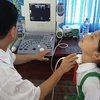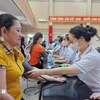Prime Minister Nguyen Tan Dung has assigned a number of tasks to the Health Ministry to ease hospital overcrowding and improve public health care.
In a meeting to evaluate the progress of a 2013-2020 project on hospital overload reduction held on March 4 in Hanoi, he requested increases in the number of beds in paediatric, tumour, orthopaedic and cardiovascular wards and the application of advanced medical equipment in central hospitals over the next five years.
In coordination with agencies and localities, the Health Ministry was asked to promote technology transfer and staff training in district-level hospitals while linking with satellite hospitals.
He suggested piloting the “family doctor” model, using technology in diagnosis, and fine-tuning mechanisms for inter-hospital examinations and diagnosis.
To that end, the leader asked for expeditious withdrawal of capital from inefficient State-owned enterprises to invest in public health care.
In her speech, Minister of Public Health Nguyen Thi Kim Tien revealed that half of central-level hospitals have committed to preventing patient bed sharing 24 hours post-admission to the hospital and that the waiting time for each test has been cut by 50 minutes.
Over the past two years, an additional three central-level hospitals have become operational, 172 wards have undergone renovations and nearly 4,000 beds have been added.
The nation has opened 116 new hospitals, re-built 1,667 provincial and district-level wards, and offered 15,535 new beds.
Health insurance cards were used in 2,111 medical stations last year, 55.6 percent at the district-level and 17.1 percent in the non-State sector.
The ratio of beds per 10,000 population hit 28.1 in 2014, an increase from 24.7 in 2012, but meeting participants noted the ratio is below that of other countries in the region and the world.
Participants also cited poor quality in lower-level hospitals as one of the contributing factors to hospital overcrowding in major cities.
Several called for rallying social investment in general clinics in public hospitals.-VNA
In a meeting to evaluate the progress of a 2013-2020 project on hospital overload reduction held on March 4 in Hanoi, he requested increases in the number of beds in paediatric, tumour, orthopaedic and cardiovascular wards and the application of advanced medical equipment in central hospitals over the next five years.
In coordination with agencies and localities, the Health Ministry was asked to promote technology transfer and staff training in district-level hospitals while linking with satellite hospitals.
He suggested piloting the “family doctor” model, using technology in diagnosis, and fine-tuning mechanisms for inter-hospital examinations and diagnosis.
To that end, the leader asked for expeditious withdrawal of capital from inefficient State-owned enterprises to invest in public health care.
In her speech, Minister of Public Health Nguyen Thi Kim Tien revealed that half of central-level hospitals have committed to preventing patient bed sharing 24 hours post-admission to the hospital and that the waiting time for each test has been cut by 50 minutes.
Over the past two years, an additional three central-level hospitals have become operational, 172 wards have undergone renovations and nearly 4,000 beds have been added.
The nation has opened 116 new hospitals, re-built 1,667 provincial and district-level wards, and offered 15,535 new beds.
Health insurance cards were used in 2,111 medical stations last year, 55.6 percent at the district-level and 17.1 percent in the non-State sector.
The ratio of beds per 10,000 population hit 28.1 in 2014, an increase from 24.7 in 2012, but meeting participants noted the ratio is below that of other countries in the region and the world.
Participants also cited poor quality in lower-level hospitals as one of the contributing factors to hospital overcrowding in major cities.
Several called for rallying social investment in general clinics in public hospitals.-VNA



















